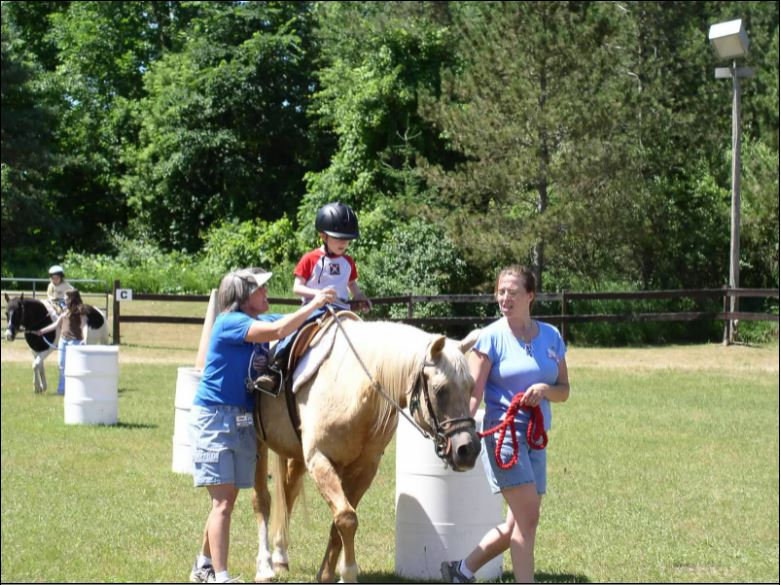KSRP establishes Kent County 4-H Special Riding Program Legacy Fund
The Kent Special Riding Program (KSRP) created the Kent County 4-H Special Riding Program Legacy Fund with the Michigan 4-H Foundation to support low-cost therapeutic horseback riding for people with disabilities.

The Kent Special Riding Program (KSRP) began as a pilot 4-H therapeutic horseback riding program with 25 students in June 1976. For four decades, KSRP provided high quality therapeutic and recreational horseback riding instruction to both children and adults with a variety of physical, mental and emotional disabilities as a Kent County 4-H Proud Equestrians Program (PEP).
“Many of our riders used wheelchairs or assistive walking devices in their daily lives,” said Rita Neumann, a former KSRP volunteer and board member. “The riders were scheduled in classes according to their individual abilities, and instructed in horse management safety and skills, both on the ground and in the saddle. Our primary goal was to maximize each rider’s physical, mental and emotional potential, independence and freedom while learning new skills and having fun.”
In 1977, Bill and Lynn Schumacher began hosting KSRP at no cost on their 32-acre farm in Alto, Mich., serving approximately 160 riders each year until it dissolved in 2017.
“Bill and Lynn were very involved in the day-to-day operation of KSRP and five of their own horses were used in the program. They both served on the KSRP board of directors, and Lynn was program director,” Neumann said.
With a lack of volunteer support, the KSRP board of directors made the difficult decision to close its doors in 2017 after Lynn passed away. Since no other 4-H therapeutic horseback riding program existed in Kent County, the KSRP board of directors dissolved its accounts and established The Kent County 4-H Special Riding Program Legacy Fund with the Michigan 4-H Foundation to support future 4-H Proud Equestrian Programs.
“KSRP funds were raised through the hard work of our volunteers and the donations from our loyal supporters with the intent to support therapeutic horseback riding for people with disabilities in Kent and surrounding counties. The KSRP board strongly believes that these funds should be used for their intended purpose. Since KSRP was the only 4-H therapeutic horseback riding program in Kent County, we would like the funds to be used to establish a new PEP program in Kent County,” Neumann said.
Over the four decades of the therapeutic horseback riding program, KSRP served well over 9,000 riders with physical, mental and/or emotional disabilities. This was accomplished through the dedicated volunteer efforts of many long-term volunteers, including the Schumachers, treasurer Louise Palczewski, secretary and Ride-a-Thon chairperson Gail Roderick, volunteer coordinator Connie VanBelkum and instructor Brenda Bera-Alters.
Neumann, a physical therapist at Mary Free Bed Rehabilitation Hospital, became involved with KSRP when she moved to Grand Rapids, Mich. in 1999. She served as a volunteer, aide, board member, horse chairperson and board of directors chairperson.
“I first became involved volunteering with therapeutic horseback riding programs when I was in high school. Through college and graduate school, I volunteered with similar programs in New Orleans, Ann Arbor, Flint, and Caledonia. I could clearly see how therapeutic horseback riding had such a profound effect on the riders’ physical, mental and emotional development. My experiences with these programs led me into my chosen profession of physical therapy,” she said.
According to Neumann, during a typical class, a rider might work on posture, balance and coordination by learning how to guide a horse through an obstacle course. Riders also improved strength and endurance by learning the two-point position, the sitting trot and the posting trot. They also gained self-confidence and independence by playing cooperative and competitive games.
A hallmark of KSRP was the commitment to providing lessons for free, or at a nominal cost to the rider. For many years, a six-week session of riding cost only $10. When the program closed, that cost had only increased to $30. The main source of funding was the annual KSRP Ride-a-Thon, a trail ride on horseback where participants obtained sponsors for their participation in the cause, similar to a 5K or other walk/race on foot.
“For the majority of years KSRP was operating, the program had the funds to operate for the entire year before the year began,” Neumann shared. “This was achieved with incredible fiscal responsibility, heavy reliance on dedicated volunteers and successful fundraising efforts that centered around the annual fall Ride-a-Thon. We are extremely thankful that KSRP did not have to close due to lack of funding.”
The Kent County 4-H Special Riding Program Legacy Fund will provide financial support to establish a new 4-H PEP in Kent County to be created prior to May 1, 2026. A plaque will be installed on or near the ramp acknowledging the funding from the 4-H Bill and Lynn Schumacher Therapeutic Horseback Riding Grant and a brief description of the history of the Kent Special Riding Program.
Volunteers in the Kent County area interested in applying for the grant and helping to create a new PEP program in Kent County should contact Glenda Kilpatrick at kilpatri@msu.edu and/or Christine Skelly at skellych@msu.edu.
If a Kent County 4-H PEP program is not implemented by the deadline in 2026, the funds shall be made available to 4-H PEP programs statewide through the Michigan 4-H Foundation mini-grant process. This grant will be advertised as The M. Louise Palczewski Therapeutic Horseback Riding Grant and will provide up to $2,000 per grant to support the creation and/or operation of one or more new or existing 4-H PEPs located in Michigan.



 Print
Print Email
Email






